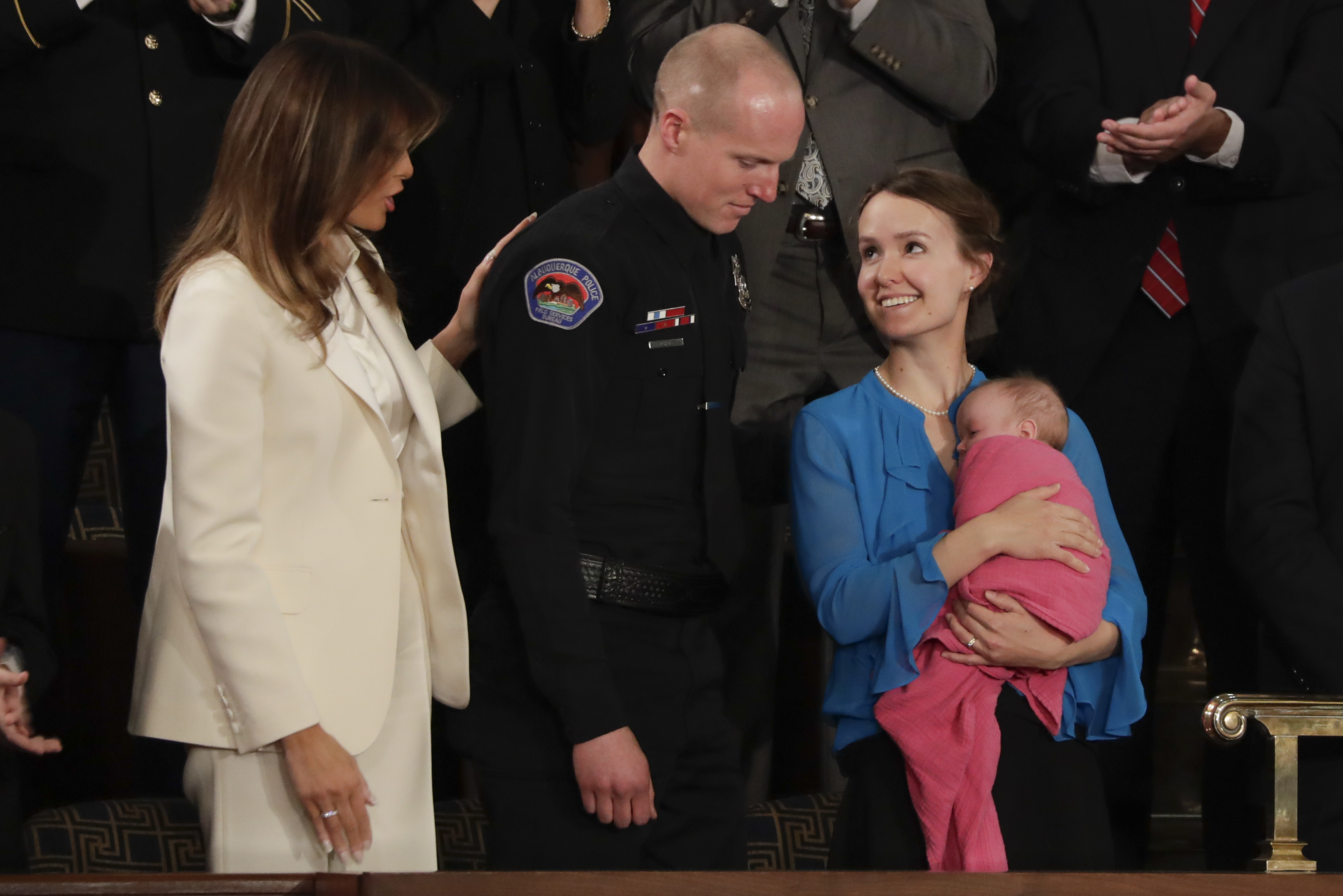The valuable lesson pro-lifers should take from Trump's State of the Union
The controversial story of baby Hope's adoption provides a template for pro-lifers who want to practice what they preach


A free daily email with the biggest news stories of the day – and the best features from TheWeek.com
You are now subscribed
Your newsletter sign-up was successful
Presidents like to fill their State of the Union addresses with inspiring anecdotes and guests: brave officers and military personnel, families touched by tragedy, hardworking businesspeople, inspiring philanthropists. But one of President Trump's guests at his first State of the Union has drawn a surprising amount of backlash.
"Ryan Holets is 27 years old, and an officer with the Albuquerque Police Department," Trump said during his speech, looking up at a police officer sitting in the gallery with his wife and an infant child. "… Last year, Ryan was on duty when he saw a pregnant, homeless woman preparing to inject heroin. When Ryan told her she was going to harm her unborn child, she began to weep. She told him she did not know where to turn, but badly wanted a safe home for her baby. In that moment, Ryan said he felt God speak to him: 'You will do it — because you can.' He took out a picture of his wife and their four kids. Then, he went home to tell his wife, Rebecca. In an instant, she agreed to adopt. The Holets named their new daughter Hope."
After the address, several pro-choice advocates criticized Trump — and, along with him, pro-lifers in general — for the focus of his story. The woman Holets met was named Crystal Champ. But in Trump's story, she remained nameless, and her fate was left undescribed. Why? Doesn't she matter, too? Slate's Christina Cauterucci said this absence was indicative of a GOP "which treats women as mere tools of reproduction." Jennifer Weiner wrote for The New York Times that for pro-lifers, "a pregnant woman, a living, breathing, thinking person, becomes no more than an environment, or a tool, whose story ends once she's given birth."
The Week
Escape your echo chamber. Get the facts behind the news, plus analysis from multiple perspectives.

Sign up for The Week's Free Newsletters
From our morning news briefing to a weekly Good News Newsletter, get the best of The Week delivered directly to your inbox.
From our morning news briefing to a weekly Good News Newsletter, get the best of The Week delivered directly to your inbox.
Trump's omission did seem conspicuous and unfair. Champ's desires and struggles, her rehabilitation and growth, are an integral piece of this story. Pro-lifers should appreciate human dignity and the sanctity of life in all its forms, from the unborn to the old, the vulnerable in the womb to the vulnerable on the streets. This story is not just about Holets' kind act, or Hope's fresh chance at life. It's also about Champ's brave decision to carry her baby to term, and to put her up for adoption. It's about her ongoing struggle with addiction, and her tenacity amid homelessness. It's about her chance at healing in the future.
Reading Champ's story, however, reveals that Trump's omissions did not reflect unkindness or apathy on the part of Holets. When the two originally met, Champ told him she was looking for someone to adopt her baby once it was born. "I just want her to be safe and secure, to be in a family and be loved," Champ told CNN in an interview.
Holets made Champ's wish (for a caring home for her baby) come true — and, after their story went viral, helped to empower and facilitate treatment for her and her partner, Tom. Holets describes them as a brother and sister in this interview with CNN, and has said he wants Crystal to be involved in her child's life in the future.
"I've gotten tired of seeing situations where I want to help, but can't," he told CNN. "And I realized I had a chance to help." Holets has started a GoFundMe page for the couple, hoping to help them with housing and medical treatment once their rehab is finished.
A free daily email with the biggest news stories of the day – and the best features from TheWeek.com
Champ sees Holets as her "personal angel on Earth here." She told CNN, "I don't know where he came from, but I'm really happy, I'm really happy he's here."
Cauterucci didn't research all this when she decided to write about Holets and Champ. Despite her frustration at Trump for not telling the whole story, it seems she didn't take the time to uncover the details for herself, thus leading her to suggest midway through her Slate piece that "it's hard to imagine a cop asking a pregnant woman with a needle in her hand for the rights to her forthcoming child without some degree of coercion." This accusation is unfair, and falls far short of the kindness Holets and his wife have shown Champ and Tom.
I've heard people accuse pro-lifers of not practicing what they preach: not being willing to adopt the babies of mothers they want to give birth, not caring about life post-birth, or not considering the needs and the desires of the mother. Often, those rebukes are warranted. But in this case, Holets achieved all three things. He did practice what he preached.
Trump, on the other hand, is not the best advocate for the pro-life movement — perhaps in large part because he has not been a member of that movement for long. He once described himself as "very pro-choice," and had difficulty articulating pro-life policy positions while running for office. But Trump's lack of understanding or compassion need not (and should not) translate into a movement-wide apathy for the needs of women. In emphasizing the Holets family, Trump (consciously or no) set up a model for his followers to emulate, an example of what pro-lifers ought to be willing to do.
For those of us who've researched and read more of Champ's story, the burden is even greater. It urges us to consider the ongoing needs of those we might meet, and to care for those needs beyond what's comfortable or easy. As Elizabeth Bruenig wrote for The Washington Post, Champ's story urges us to remember "that helping is hard and that it is good; that what someone needs ought to be considered before and above what we think they deserve; that if people can't destroy their own human dignity even with self-destructive acts, then it follows we should never fail to recognize that dignity in our laws and social programs."
We have a burden to serve the Crystals and Toms and Hopes of the world — to make sure they are named and remembered, long after State of the Union addresses are finished. Are we also willing to practice what we preach?
Gracy Olmstead is a writer and journalist located outside Washington, D.C. She's written for The American Conservative, National Review, The Federalist, and The Washington Times, among others.
